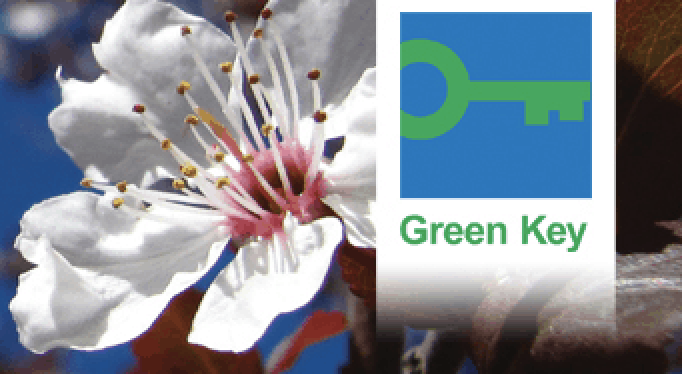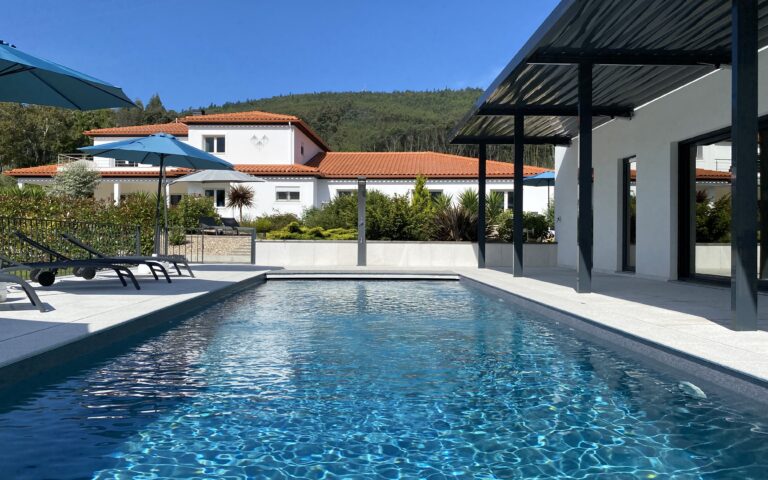We are a Green Key Bed & Breakfast
You are staying at a Green Key B&B which makes a special effort to protect the environment and therefore the climate. We have made improvements to ensure that both we, and you as our guest, are “greener”.
Green Key is the international eco-label of the tourism industry, which is awarded to companies that comply with a number of environmental requirements in many different areas.
The B&B must, for instance, introduce environmental management, reduce its energy and water consumption, sort waste, use environmentally friendly cleaning products, promote organic products, avoid chemical herbicides and much more.
When you choose to stay at a Green Key B&B, you help to protect the environment.
Green Key is established in more than 40 countries but more are being added to the list. In Portugal, the Secretariat falls under ABAE.
Read more at www.greenkey.abae.pt
What we do at Casa Carvalhal, for a minimal impact on the environment, while still guaranteeing our customers maximum comfort:
Cleaning the house / rooms
- The floors are cleaned with a floor wiper system using a maximum of 5 liters of water. This also means that the use of cleaning or disinfecting agents can be kept to a minimum.
- The bagless vacuum cleaner has a low energy consumption of up to 800 Watt with a long lifespan but is still very efficient. An extra wide floor nozzle is also used, which saves time and energy. There are also no paper bags to throw away, which saves the environment.
- Microfiber cloths are used to clean surfaces and windows, so that no or less cleaning agent is needed.
- The use of chemicals is kept to a minimum by:
- To be dosed according to the manufacturer’s instructions for use
- Always use the minimum amount of product as a basis
- Use as many products as possible on a natural basis
- The guest rooms are thoroughly and completely wet cleaned before arrival.
- During the stay, the guest rooms are mainly dry cleaned daily, with the exception of the bathroom. This is always wet cleaned.
- The cleaning of the rooms is of course done in accordance with government regulations and will be more extensive when required by, for example, a pandemic.
Energy consumption
Lighting
- All light fixtures are equipped with LED lighting
- When leaving the room, the guest is asked to turn off all lights
- There is no electric heating in the room
- The common areas are equipped with lighting with a timer to limit energy consumption.
- The outdoor lighting is always turned off at midnight.
- The entrance hall, corridors and terraces at the front are equipped with sensors.
Heating
- The heating of the AL is based on an energy efficient central heating with pellets combined with radiators throughout the house.
- The pellets are delivered by pallet from a manufacturer just 20km away from our house: Pinewells from Arganil. In this way, contamination from transport is kept to a minimum. The pellets are mainly made from sawdust and waste wood according to EN plus / A1 standard.
- The boiler is cleaned at regular intervals in accordance with the manufacturer’s instructions to ensure optimal combustion.
- All radiators in all rooms are equipped with thermostatic valves.
- Unused rooms are heated to a maximum of 16 ° C in winter.
- The common living room is equipped with a high efficiency stove.
- The stove is only used in the winter season, not in the in-between seasons.
- The wood used mainly comes from our own garden or is purchased locally. No sustainable or endangered woods are used for combustion. The wood has a minimum drying time of 2 years.
- The fire is lit according to the Scandinavian ecological method, whereby the fire is lit on top of the wood stack in the stove. This prevents large smoke formation and ensures better combustion and more efficiency.
- The heating of the private house is based on solar panels in combination with a low temperature heat pump and underfloor heating. This form of heating is possible due to the high degree of insulation of the house, the windows and the floor.
Warm water
- The hot water in the AL is based on solar panels with glycol with a large storage tank. When there is not enough solar capacity or when the consumption is so high that extra heat is needed to guarantee a base temperature of 48 ° C, there are various systems to make up for the shortage. With active central heating, it will step in if necessary. When the central heating does not work, the shortage will be filled electrically or with a gas boiler.
- The hot water in the private house is based on solar panels with water with a large storage tank. If there is not enough solar capacity or if the consumption is so high that extra heat is needed to guarantee the basic temperature of 48 ° C, the shortage will be filled by a heat pump.
Swimming pool
- The pool is heated from April to October.
- All extra energy (energy not needed for heating the house or sanitary hot water) generated by the solar panels is systematically pumped into the pool.
- The swimming pool is equipped with a solar shutter. This roller shutter can heat the pool water up to 7 ° C extra and also prevents evaporation of the water.
- If the above systems are not sufficient to maintain the swimming pool at a minimum temperature of 27 ° C, a heat pump can be switched on.
- The heat pump is fully temperature controlled and takes into account the heat supplied by the solar panels.
- The outdoor shower at the pool is heated with solar energy.
Electrical devices
- 80% of the appliances have an energy-efficient label.
- Induction hobs are used for cooking for the highest possible energy efficiency.
- New appliances that are purchased are always with the best energy label.
Water consumption
- All toilets are fitted with a 3/6 L button.
- All showers are equipped with a water-saving shower head.
- All taps limit the flow to 70%.
- The swimming pool is equipped with a roller shutter which prevents water evaporation.
- The automatic irrigation system ensures maximum watering of the lawn with minimal water consumption.
- The other garden areas are equipped with garden cloth to minimize the evaporation of water, so that watering can be reduced to a minimum.
- Bed linen is only changed when changing the room, at the request of the customer or after a 4 day stay. A duvet with cover and bottom sheet is used. As a result, washing the duvet itself can be delayed longer, which saves large amounts of water. A 17kg washing machine is used to wash the sheets. This allows large quantities to be washed in an environmentally conscious and water-saving manner.
- Towels are washed at the request of the customer. Towel on the floor = washing. Towel on the hook = I use it again. The customer is clearly informed about this procedure in the room.
Nutrition
- For our breakfast buffet we try to offer the widest possible range and also encourage as little waste as possible by:
- Maximum avoidance of individual packaging
- Working with home-made products as much as possible
- Purchase products locally as much as possible
- Operate a buffet
Waste
- We separate the waste according to local regulations, whereby a distinction is made between:
- Plastic packaging material and metal
- Glass
- Paper and cardboard
- Residual waste
- Garden waste
- Our customers are asked to separate their waste. One waste bin in the bathroom for all waste that cannot be recycled like residual waste, hygienic waste, non-recyclable packaging, dirty packaging. Waste bins in the hall for only recyclable material like paper, plastic, metal and glass packaging.
- Garden waste such as grass or small pruning that cannot be used for the stove is disposed of at the municipal landfill for green waste.
Where are we still trying to make a difference?
- Paper pads, large napkins and household paper cause a great deal of pollution. We try to keep its use to a minimum.
- Fabric softeners are very harmful to the environment. We try to keep their use to a minimum so that our towels stay whiter. The disadvantage of this is that our towels are not super soft.
- Our laundry is almost exclusively dried in the fresh air. This also has an influence on the softness of the laundry. Only in exceptionally long-term bad weather is an energy-efficient dryer with heat pump used or we dry the laundry indoors on the line in combination with an energy-efficient dehumidifier.
- The dishwashers, washing machines are only used with a full load.
- We use an electric mower on rechargeable batteries to mow the lawn.

